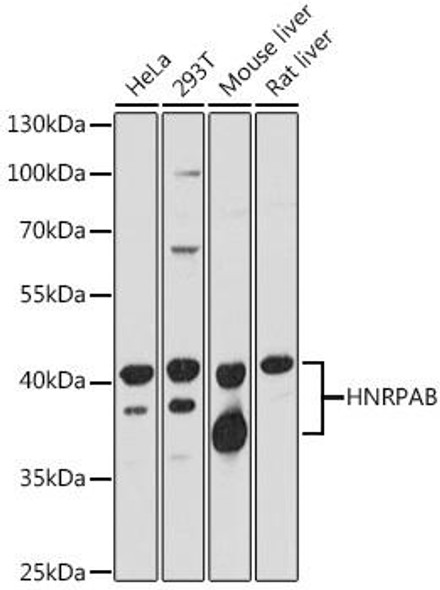PDS5B Antibody (PACO51158)
- SKU:
- PACO51158
- Product Type:
- Antibody
- Reactivity:
- Human
- Host Species:
- Rabbit
- Isotype:
- IgG
- Applications:
- ELISA
- Antibody Type:
- Polyclonal Antibody
- Conjugation:
- Unconjugated
Description
PDS5B Antibody (PACO51158)
The PDS5B Monoclonal Antibody (PACO51158) is a valuable tool for researchers studying the PDS5B protein, which plays a key role in chromatin structure and genomic stability. This antibody, produced through a monoclonal antibody development process, specifically targets PDS5B in human samples and is validated for use in various applications, including Western blot and immunofluorescence.PDS5B is known for its involvement in the regulation of chromosome cohesion and DNA repair mechanisms, making it an important player in maintaining genome integrity. Dysregulation of PDS5B has been linked to various diseases, including cancer and developmental disorders, making it a promising target for further research.
By using the PDS5B Monoclonal Antibody (PACO51158), researchers can effectively detect and analyze PDS5B protein levels in different cell types, enabling a better understanding of its function and potential implications in disease pathology. This antibody is a valuable tool for studies in molecular biology, genetics, and cancer research, providing insights into the role of PDS5B in chromatin dynamics and genomic stability.
| Antibody Name: | PDS5B Antibody (PACO51158) |
| Antibody SKU: | PACO51158 |
| Size: | 50ug |
| Host Species: | Rabbit |
| Tested Applications: | ELISA |
| Recommended Dilutions: | |
| Species Reactivity: | Human |
| Immunogen: | Recombinant Human Sister chromatid cohesion protein PDS5 homolog B protein (3-124AA) |
| Form: | Liquid |
| Storage Buffer: | Preservative: 0.03% Proclin 300 Constituents: 50% Glycerol, 0.01M PBS, pH 7.4 |
| Purification Method: | >95%, Protein G purified |
| Clonality: | Polyclonal |
| Isotype: | IgG |
| Conjugate: | Non-conjugated |
| Background: | Regulator of sister chromatid cohesion in mitosis which may stabilize cohesin complex association with chromatin. May couple sister chromatid cohesion during mitosis to DNA replication. Cohesion ensures that chromosome partitioning is accurate in both meiotic and mitotic cells and plays an important role in DNA repair. Plays a role in androgen-induced proliferative arrest in prostate cells. |
| Synonyms: | Sister chromatid cohesion protein PDS5 homolog B (Androgen-induced proliferation inhibitor) (Androgen-induced prostate proliferative shutoff-associated protein AS3), PDS5B, APRIN AS3 KIAA0979 |
| UniProt Protein Function: | APRIN: a widely expressed nuclear protein. Is lost in many cancers and may function as a tumor suppressor. Correlates with differentiation in embryonal carcinoma stem cells; its knockdown disrupted Nanog, Oct4, and SOX2 regulation. Plays a role in androgen-induced proliferative arrest in prostate cells. Is upregulated in androgen-sensitive LNCaP prostate cancer cells undergoing androgen-induced proliferative block. Required for maintenance of sister chromatid cohesion during mitosis. May couple sister chromatid cohesion during mitosis to DNA replication. Cohesion ensures that chromosome partitioning is accurate in both meiotic and mitotic cells and plays an important role in DNA repair. Belongs to the PDS5 family. Induced by the synthetic androgen R1881 in prostate carcinoma cells undergoing proliferative arrest. Phosphorylated upon DNA damage. Maximum levels occur 18-20 hours after androgen exposure. Interacts with the cohesin complex. Phosphorylated upon DNA damage, probably by ATM or ATR. Five isoforms of the human protein are produced by alternative splicing. |
| UniProt Protein Details: | Protein type:Cell development/differentiation; DNA-binding Chromosomal Location of Human Ortholog: 13q12.3 Cellular Component: nucleoplasm; chromosome; nucleus; chromatin; cytosol; chromosome, pericentric region Molecular Function:protein binding; DNA binding; ATP binding Biological Process: negative regulation of cell proliferation; cell proliferation; cell division; mitotic sister chromatid cohesion; mitotic cell cycle; regulation of cell proliferation |
| NCBI Summary: | This gene encodes a protein that interacts with the conserved protein complex termed cohesin. The cohesin complex holds together sister chromatids and facilitates accurate chromosome segregation during mitosis and meiosis. This protein is also a negative regulator of cell proliferation and may be a tumor-suppressor gene. [provided by RefSeq, Jul 2015] |
| UniProt Code: | Q9NTI5 |
| NCBI GenInfo Identifier: | 74725312 |
| NCBI Gene ID: | 23047 |
| NCBI Accession: | Q9NTI5.1 |
| UniProt Related Accession: | Q9NTI5 |
| Molecular Weight: | 165 kDa |
| NCBI Full Name: | Sister chromatid cohesion protein PDS5 homolog B |
| NCBI Synonym Full Names: | PDS5 cohesin associated factor B |
| NCBI Official Symbol: | PDS5B |
| NCBI Official Synonym Symbols: | AS3; APRIN; CG008 |
| NCBI Protein Information: | sister chromatid cohesion protein PDS5 homolog B |
| UniProt Protein Name: | Sister chromatid cohesion protein PDS5 homolog B |
| UniProt Synonym Protein Names: | Androgen-induced proliferation inhibitor; Androgen-induced prostate proliferative shutoff-associated protein AS3 |
| Protein Family: | Sister chromatid cohesion protein |
| UniProt Gene Name: | PDS5B |
| UniProt Entry Name: | PDS5B_HUMAN |









